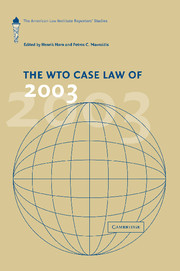Book contents
- Frontmatter
- Contents
- Foreword
- A Note on the American Law Institute
- American Law Institute Reporters
- 1 Introduction
- 2 European Communities – Anti-Dumping Duties on Imports of Cotton-Type Bed Linen from India (AB-2000-13, WT/DS141/AB/R:DSR 2003: III, 965): Recourse to Article 21.5 of the DSU by India
- 3 United States – Sunset Review of Anti-Dumping Duties on Corrosion-Resistant Carbon Steel Flat Products From Japan (AB-2003-5, WT/DS244/AB/R): A Legal and Economic Analysis of the Appellate Body Ruling
- 4 United States – Continued Dumping and Subsidy Offset Act of 2000 (WT/DS217/AB/R: DSR 2003:I,375)
- 5 European Community – Antidumping Duties on Malleable Cast Iron Tube or Pipe Fittings from Brazil (WT/DS219/AB/R: DSR 2003:VI, 2613)
- 6 United States – Final Determination with Respect to Certain Softwood Lumber from Canada (AB-2003-6, WT/DS257/AB/R)
- 7 United States – Definitive Safeguard Measures on Imports of Certain Steel Products (WT/DS259; WT/DS252; WT/DS248; WT/DS249; WT/DS251; WT/DS258; WT/DS254; WT/DS253: DSR 2003:VII, 3117)
- 8 Mexico – Measures Affecting Telecommunications Services (WT/DS204/R): A Comment on “El mess in TELMEX”
- 9 European Communities – Conditions for the Granting of Tariff Preferences to Developing Countries (WT/DS246/AB/R)
- 10 United States – Anti-Dumping Act of 1916 (Original Complaint by the European Communities) – Recourse to Arbitration by the United States under 22.6 of the DSU, WT/DS136/ARB, 24 February 2004: A Legal and Economic Analysis
- 11 Japan – Measures Affecting the Importation of Apples (AB-2003-4): One Bad Apple? (DS245/AB/R): A Comment
- Index
Foreword
Published online by Cambridge University Press: 06 July 2010
- Frontmatter
- Contents
- Foreword
- A Note on the American Law Institute
- American Law Institute Reporters
- 1 Introduction
- 2 European Communities – Anti-Dumping Duties on Imports of Cotton-Type Bed Linen from India (AB-2000-13, WT/DS141/AB/R:DSR 2003: III, 965): Recourse to Article 21.5 of the DSU by India
- 3 United States – Sunset Review of Anti-Dumping Duties on Corrosion-Resistant Carbon Steel Flat Products From Japan (AB-2003-5, WT/DS244/AB/R): A Legal and Economic Analysis of the Appellate Body Ruling
- 4 United States – Continued Dumping and Subsidy Offset Act of 2000 (WT/DS217/AB/R: DSR 2003:I,375)
- 5 European Community – Antidumping Duties on Malleable Cast Iron Tube or Pipe Fittings from Brazil (WT/DS219/AB/R: DSR 2003:VI, 2613)
- 6 United States – Final Determination with Respect to Certain Softwood Lumber from Canada (AB-2003-6, WT/DS257/AB/R)
- 7 United States – Definitive Safeguard Measures on Imports of Certain Steel Products (WT/DS259; WT/DS252; WT/DS248; WT/DS249; WT/DS251; WT/DS258; WT/DS254; WT/DS253: DSR 2003:VII, 3117)
- 8 Mexico – Measures Affecting Telecommunications Services (WT/DS204/R): A Comment on “El mess in TELMEX”
- 9 European Communities – Conditions for the Granting of Tariff Preferences to Developing Countries (WT/DS246/AB/R)
- 10 United States – Anti-Dumping Act of 1916 (Original Complaint by the European Communities) – Recourse to Arbitration by the United States under 22.6 of the DSU, WT/DS136/ARB, 24 February 2004: A Legal and Economic Analysis
- 11 Japan – Measures Affecting the Importation of Apples (AB-2003-4): One Bad Apple? (DS245/AB/R): A Comment
- Index
Summary
This is the third volume in the American Law Institute's effort to analyze decisions rendered in disputes before the World Trade Organization.
Trade Law is in its infancy as a body of legal doctrine. In two prior volumes, the ALI sponsored analyses of decisions issued in 2001 and 2002. This book presents an examination of decisions rendered in 2003. As before, the work has been accomplished by teams consisting of a lawyer and an economist, each a distinguished expert on the world trading system. Early drafts were criticized by the various participants, and then redrafts were presented to an international group of experts at a meeting in April 2005 at the WTO headquarters in Geneva.
Having studied three years of WTO decisions in this “bottom-up” manner, we will now begin to draft the general principles of trade law. We also hope to continue with the analysis of individual decisions.
We are immensely grateful to the two leaders of this project, Henrik Horn of Stockholm University and Petros Mavroidis of the University of Neuchâtel and Columbia University. We also appreciate the work of the economists and lawyers who wrote the studies in this volume. And we appreciate the generous financial support for our project from Jan Wallander's and Tom Hedelius' Research Foundation, Svenska Handelsbanken, Stockholm, and the Milton and Miriam Handler Foundation.
- Type
- Chapter
- Information
- The WTO Case Law of 2003The American Law Institute Reporters' Studies, pp. viiPublisher: Cambridge University PressPrint publication year: 2006

